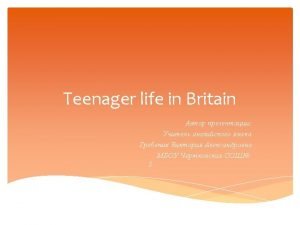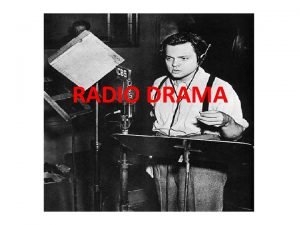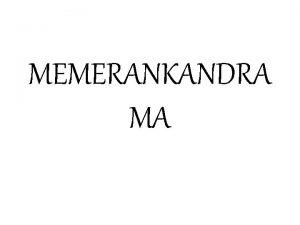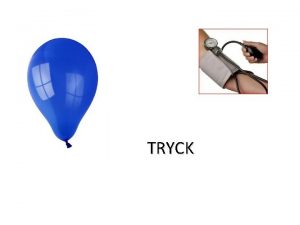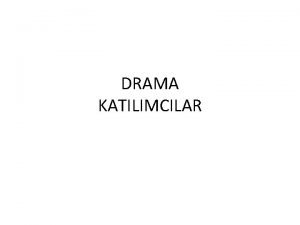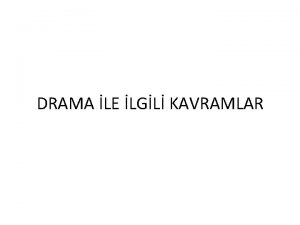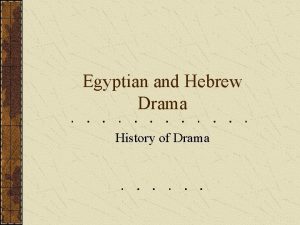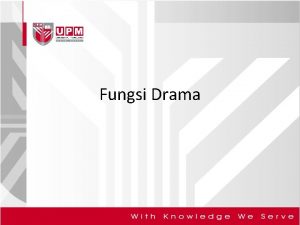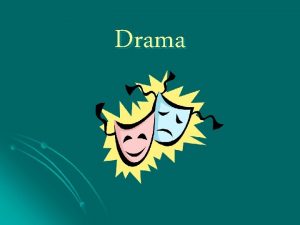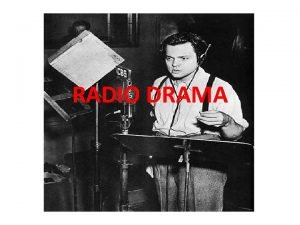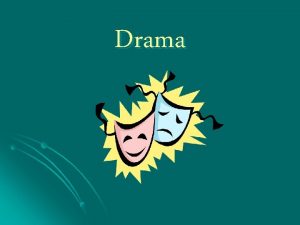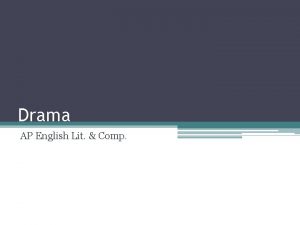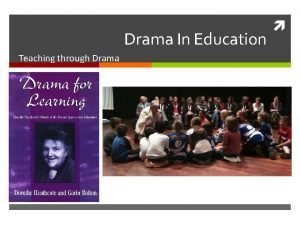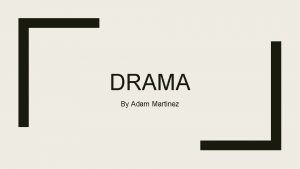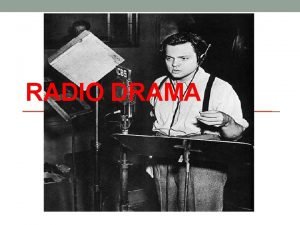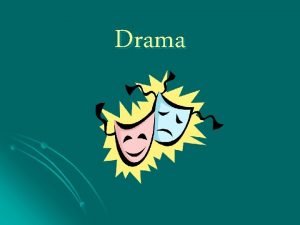ASSESSMENT FOR KS 3 DRAMA Ali Warren Catherine




















- Slides: 20

ASSESSMENT FOR KS 3 DRAMA Ali Warren & Catherine Nash No Nonsense Drama

Who Are We? Ali Warren Catherine Nash • Subject Leader of Drama at Clarendon Academy in Trowbridge, Wiltshire • Teacher of BTEC Performing Arts & AQA Technical Performing Arts • Arts Award facilitator • Teaches units for Drama PGCE at Bath Spa University • Founding Fellow of the Chartered Collage of Teaching • Head of Drama at Kingswood School, Bath • Has taught AQA GCSE and A Level Drama for 15 years • Examiner & moderator for AQA GCSE Drama • Founding Fellow of the Chartered Collage of Teaching

Why Are We Here? 1) Drama is a serious academic discipline 2) Drama is under threat in many schools 3) In order to survive (and thrive) we must be able to provide the data required by SLT 4) This data should be meaningful 5) This is easy to do at KS 4/5 but more challenging at KS 3 6) We are writing a book!

A Disclaimer! We only have 45 minutes so, in that time, can only give you a snap shot of how we create meaningful data at KS 3* *For more information look out for our book or speak to us about organising bespoke CPD in your school!!

What Do We Assess in KS 3 Drama? nce Characterisation g n i t l a e na His r C igi tor r yo O ama ng) f i Th r D evis ea tre (D Use of Techniques g n iti Script Writing g n i g a t s le y t S r e p of Improvisation Eva S luat ive Skil ls r ‘Soft Skills’ W y a s s E Page to Stage/Script work a m r o f Performance Skills ig s e D s l l i k n. S Different genre

Astonishing Facts • KS 2 – Drama comes under the National Curriculum • KS 4/5 – Drama assessment covered by exam board criteria There is no approved up to date method of assessing students in Drama at KS 3; the last serious attempt was 2002!

Why Do We Assess in KS 3 Drama? • To create meaningful data to share with SLT/parents • So the students know where they are; after all they are now used to this system • To prove progress at KS 3 • To prove our worth in the current education climate • To help students make suitable choices at KS 4 • To help parents allow their children to make suitable choices at KS 4 • To prepare our students for the academic demands of future Drama courses – GCSE, A Level, BTEC – and beyond!

How Do We Assess in KS 3 Drama? Creating Performing Evaluating

Marking a Performance Video Clip – KS 3 Drama at Kingswood School

Marking a Performance Pick a number, any number? Tempting, but not realistic and certainly not meaningful! Use our Dramatic intuition, the ‘gut feeling’? The ‘go to’ assessment tool of the busy Drama teacher but we can’t prove these results to anyone else Look at what we gave them last time and give them one level up? This will show progress but is unreliable and therefore not meaningful

Marking a Performance Put them in a rank order? This can be a really useful part of assessment but there still needs to be a common standard Give them a level based on the Arts in Schools criteria? Again, a useful starting point but we have found that these descriptions are not detailed enough to be effective Create our own ‘indicative content’? Well, now you mention it, here’s one we made earlier…. . !.

Year 7 Baseline Assessment – Tableaux Assessment Area: Performing LEVEL 1 2 3 PHYSICAL SKILL INDIVIDUAL Unable to hold a still position, no or inappropriate facial expression, gesture and/or body language, frequently comes out of character PHYSICAL SKILL – GROUP Levels are not used, performers may be blocked or are blocking. Little or no sense of audience. Transitions are overly complicated or ‘messy’. Little or no consistency when the group move and/or freeze. Individual tableau may demonstrate a divided group Able to hold a mostly still Some of the tableaux show a good position, appropriate use of levels. There is an awareness facial expression, gesture of audience who can see most of and body language, what is going on. Transitions are character is sustained mostly choreographed well and are whilst in tableaux but may well executed. There is a sense that drop during transitions. the group know when they should move and/or freeze and this is handled well for the most part. Some images are cohesive Able to hold tableaux All tableaux use levels well. The completely still. Facial audience are able to clearly see expressions, body language everything that is going on. and gestures are clear and Transitions are ‘clean’ and smooth. entirely appropriate. Each tableaux show one complete Sustains role through the image piece. EFFECTIVE COMMUNICATION OF SCENARIO GROUP CO-OPERATION/USE OF REHEARSAL TIME Performance has no sense of storyline and/or characters present. Audience are confused as to the key fundamentals of the scene. Evidence that use of available rehearsal time is poor; passive with the group; no evidence of response to feedback given by peers Some sense of storyline, although this may be clearer in some tableaux than others. Some of the audience will be able to make suggestions as to what is happening, although others may be confused. Takes an active role but can be dominating or distracting; Will listen to feedback but this is not consistently applied in practical work. A good sense of storyline with clear progression of plot and clear communication of character. The audience can suggest credible explanations for what is happening. Takes a proactive role and is able to both give and listen to ideas, showing a willingness to develop the piece using a collaborative approach. evidence of some response to feedback given by peers

Using the Indicative Content Assessment Grids • Using the criteria give each student a mark out of 3 for each of the 4 assessment criteria • Total the 4 marks together e. g. Bobster gets 2, 1, 3, 2 2+1+3+2 =8 out of possible 12 8/4 = 2 For this baseline assessment Bobster gets a leve • Divide the total by 4 to get an average level* *If, like Catherine’s school, you require percentages rather than just a level simply add a column with numbers for each level and award each student a mark for each (use the AQA rule of thumb – a student directly meeting all the criteria in the box gets a mark halfway between the top and bottom marks for that criteria). Add those 4 marks together and calculate a percentage

Year 7 - GROUNDWORK 1/QUEEN NAFFYTUTU Assessment Area: Creating LEVEL 1 2 3 4 RESPONSE TO INPUT/STIMULI Limited approach to stimuli or no response at all. Pedestrian response to stimuli; lacks understanding/ability to comprehend to others’ suggestions Has a range of personal responses and is able to appreciate the wider potential of the source material without being able to express it for themselves. Comes up with a wide range of ideas – some of which will be possible to put into practice INVENTION GROUP CO-OPERATION USE OF REHEARSAL TIME No original ideas; everything comes from examples offered by others including the teacher. Ideas are mundane, prosaic or lack imagination Limited co-operation with others. Finds it difficult to establish a group dynamic without external support. Unable to make any progress without guidance from others including teacher Ideas are interesting and reasonably imaginative Is engaged with the group activity and can make suggestions to develop the ideas of others Good use is made of rehearsal time; one idea developed as a single focus. Ideas are full of potential with the opportunity for them to be takes on a facilitative role – leading and formulating some elements Full use of rehearsal time is made where one or tow possible ideas are explored. Is not fully engaged in the Will accept the direction of activity by passive or others distracting behaviours

Marking the Evaluation Process • Assessing self evaluation & peer Some points to evaluation consider • Keeping evidence of verbal responses • Short & spontaneous v long more considered responses • Using books or worksheets • Whatever the method this can still be marked using indicative content mark schemes

How The Mark Schemes Work You will be able to be create a simple equation over the course of a year to come up with an accurate level across the three strands of Creating, Performing and Evaluating These marks are based on potential Year 7 marks; you would be expecting results in the region of Level 3/4 to make appropriate progress. TOTAL SCORE FOR REPORTING PURPOSES PRODUCING AN AVERAGE DIVIDE BY 3 NAME OF STUDENT CREATING PERFORMING EVALUATIVE BOBSTER 3 2 3 AMY 4 4 2 3. 4 JAMEL 1 4 2 2. 3 WORKING TOWARDS LEVEL 4 LEVEL 2 LAUREN 3 3 LEVEL 3 2. 6

Using the Data The data you have generated could be used to: • Reassure SLT that pupils are learning and making progress in Drama • Demonstrate to parents whether or not their child has the potential to study Drama at KS 4 and beyond • Make level predictions for KS 4 • Inform your own teaching practice • Guide students to making progress in specific areas of their

If We Had More Time…. . Other Ways of Assessing Knowledge and Understanding in KS 3 Drama Written work Efficient Marking Methods Tests an d t e t a ten e r on c il e c p Pu ativ Quick Fire c i ind Questioning Open questioning Knowledge Organisers d Quizze s s Pee e s s r. A t n e sm Se Feedback responses lf A sse s sm ent

No Nonsense Drama Support • No Nonsense support for Drama teachers at all Key Stages • Bespoke In School Workshops and CPD for Drama teachers • Workshops for students • Email us No. Nonsense. Drama@gmail. com

NO NONSENSE SUPPORT FOR DRAMA TEACHERS Ali Warren & Catherine Nash No. Nonsense. Drama@gmail. c om
 Serial soap opera
Serial soap opera Eğitici drama ve yaratıcı drama arasındaki fark
Eğitici drama ve yaratıcı drama arasındaki fark Drama sa radio
Drama sa radio Drama berasal dari
Drama berasal dari Kontinuitetshantering i praktiken
Kontinuitetshantering i praktiken Typiska drag för en novell
Typiska drag för en novell Tack för att ni lyssnade bild
Tack för att ni lyssnade bild Vad står k.r.å.k.a.n för
Vad står k.r.å.k.a.n för Varför kallas perioden 1918-1939 för mellankrigstiden?
Varför kallas perioden 1918-1939 för mellankrigstiden? En lathund för arbete med kontinuitetshantering
En lathund för arbete med kontinuitetshantering Personalliggare bygg undantag
Personalliggare bygg undantag Tidbok yrkesförare
Tidbok yrkesförare Anatomi organ reproduksi
Anatomi organ reproduksi Förklara densitet för barn
Förklara densitet för barn Datorkunskap för nybörjare
Datorkunskap för nybörjare Stig kerman
Stig kerman Mall för debattartikel
Mall för debattartikel För och nackdelar med firo
För och nackdelar med firo Nyckelkompetenser för livslångt lärande
Nyckelkompetenser för livslångt lärande Påbyggnader för flakfordon
Påbyggnader för flakfordon Tryck formel
Tryck formel
